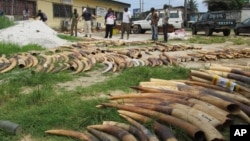Researchers say poachers may have killed as many as two-thirds of the elephants in Gabon's Minkebe National Park in the past eight years.
Results of an ongoing survey released by the government Wednesday show a loss of 11,000 elephants in the park since a similar survey was conducted in 2004.
In an interview with VOA, Fiona Maisels of the U.S.-based Wildlife Conservation Society said increased access to the park has spurred an increase in poaching.
"With forestry concessions there have come roads and then it is much easier for ivory traffickers to evacuate ivory on a road than it is from walking. And, also, there is this porous border on the Cameroon side," she said.
The Wildlife Conservation Society is helping the Gabonese government analyze data from the survey. Maisels says the intense poaching that has cut Gabon's elephant population is part of a much larger problem affecting the region.
"We have been seeing this kind of loss all across the Congo basin in the last six or seven years. Ivory prices have rocketed in the Far East," she noted. "This is because of huge hikes in demand. People can now afford to buy ivory, particularly in China, where they could not before. It has led to basically organized crime."
The trade in elephant ivory was mostly outlawed in a 1989 treaty but illegal killing of elephants has continued. Much of the poaching is the work of organized crime syndicates.
Kenyan wildlife officials said poaching resulted in the deaths of 384 elephants in 2012. In South Africa, a record 668 rhinos were slaughtered last year, as poachers also take advantage of Asian demand for rhino horn.
The Gabonese government says the Minkebe National Park is the largest elephant sanctuary in the Congo Basin. Gabon is estimated to host more than half of Africa's 40,000 forest elephants.
Results of an ongoing survey released by the government Wednesday show a loss of 11,000 elephants in the park since a similar survey was conducted in 2004.
In an interview with VOA, Fiona Maisels of the U.S.-based Wildlife Conservation Society said increased access to the park has spurred an increase in poaching.
"With forestry concessions there have come roads and then it is much easier for ivory traffickers to evacuate ivory on a road than it is from walking. And, also, there is this porous border on the Cameroon side," she said.
The Wildlife Conservation Society is helping the Gabonese government analyze data from the survey. Maisels says the intense poaching that has cut Gabon's elephant population is part of a much larger problem affecting the region.
"We have been seeing this kind of loss all across the Congo basin in the last six or seven years. Ivory prices have rocketed in the Far East," she noted. "This is because of huge hikes in demand. People can now afford to buy ivory, particularly in China, where they could not before. It has led to basically organized crime."
The trade in elephant ivory was mostly outlawed in a 1989 treaty but illegal killing of elephants has continued. Much of the poaching is the work of organized crime syndicates.
Kenyan wildlife officials said poaching resulted in the deaths of 384 elephants in 2012. In South Africa, a record 668 rhinos were slaughtered last year, as poachers also take advantage of Asian demand for rhino horn.
The Gabonese government says the Minkebe National Park is the largest elephant sanctuary in the Congo Basin. Gabon is estimated to host more than half of Africa's 40,000 forest elephants.





